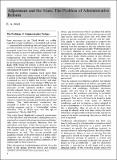| dc.contributor.author | Brett, E. A. | en |
| dc.date.accessioned | 2016-04-07T13:57:02Z | |
| dc.date.available | 2016-04-07T13:57:02Z | |
| dc.date.issued | 01/10/1988 | en |
| dc.identifier.citation | Brett, E. A. (1988) Adjustment and the State: The Problem of Administrative Reform. IDS Bulletin 19(4): 4-11 | en |
| dc.identifier.issn | 1759-5436 | en |
| dc.identifier.uri | https://opendocs.ids.ac.uk/opendocs/handle/20.500.12413/10418 | |
| dc.description.abstract | Summary Summary Administrative structures in LDCs are widely regarded as inefficient, authoritarian and corrupt; a major obstacle to economic and political reform. This article sets out to review the general debate which this problem has engendered, both in relation to the critique of the orthodox bureaucratic model and to the alternative forms of structure now being actively experimented with. The first section discusses the relevance of the issue and the second sets out the basic assumptions of the orthodox model, notably the nature of the relationship between democratic control, administrative autonomy and technical expertise. The third sets out four explanations for poor performance — those provided by modernisation theory, functionalism, liberalism and Marxism. The final section examines the major solutions now being put forward by these critics — those based on training, decentralisation, privatisation and democratisation. Resumé Resumé Ajustement et Etat; Le Problème des Réformes administratives Les structures administratives dans les pays moins développés sont généralement considérées inefficaces, autoritaires et corrompues; un obstacle majeur aux réformes économiques et politiques. Cert article se propose de présenter une revue du débat que ce problème a engendré, à la fois par rapport à la critique du modèle bureaucratique orthodoxe et aux différentes formes de structure actuellement à l'essai. La première section pose la question de la pertinence du problème et la deuxième, à partir des hypothèses données par le modèle orthodoxe, notamment la nature de la relation entre contrôle démocratique, autonomie administrative et compétence technique. La troisième partie présente quatre explications pour le manque de résultats — celles données par la théorie de modernisation, par le functionalisme, libéralisme et Marxisme. La dernière section examine les solutions majeures qui sont maintenant proposées par ces critiques — celles basées sur la formation, la décentralisation, la privatisation et la démocratisation. | en |
| dc.format.extent | 8 | en |
| dc.publisher | Institute of Development Studies | en |
| dc.relation.ispartofseries | IDS Bulletin Vol. 19 Nos. 4 | en |
| dc.rights.uri | http://www.ids.ac.uk/files/dmfile/IDSOpenDocsStandardTermsOfUse.pdf | en |
| dc.title | Adjustment and the State: The Problem of Administrative Reform | en |
| dc.type | Article | en |
| dc.rights.holder | © 1988 Institue of Development Studies | en |
| dc.identifier.doi | 10.1111/j.1759-5436.1988.mp19004002.x | en |

